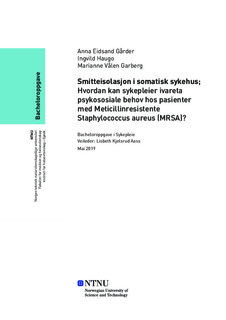| dc.contributor.advisor | Aass, Lisbeth Kjelsrud | |
| dc.contributor.author | Gårder, Anna Eidsand | |
| dc.contributor.author | Haugo, Ingvild | |
| dc.contributor.author | Garberg, Marianne Vålen | |
| dc.date.accessioned | 2019-09-06T14:04:32Z | |
| dc.date.available | 2019-09-06T14:04:32Z | |
| dc.date.issued | 2019 | |
| dc.identifier.uri | http://hdl.handle.net/11250/2613369 | |
| dc.description.abstract | Introduksjon:
Isolasjon grunnet infeksjon kan føre til utfordringer både for pasient og helsepersonell.
Smitteverntiltak i somatisk sykehus vil være nødvendig for å hindre at smitten sprer seg. Pasienten
kan føle det som en psykisk påkjenning å være isolert over en lengre periode.
Hensikt:
Hensikten er å belyse hvordan psykososiale behov hos pasienter med MRSA påvirkes av
isolasjon. I tillegg hva vi som sykepleiere kan gjøre for å ivareta den psykiske helsen til denne
pasientgruppen.
Metode:
Oppgaven er en systematisk litteraturstudie med strukturert søk i databasene: Cinahl, Medline og
SweMed+. Det er inkludert 5 artikler av både kvalitativ og kvantitativ forskning, som er vurdert,
analysert og funn er identifisert.
Resultat:
Respondentene i studiene vi har analysert hadde forskjellige erfaringer knyttet til isolering.
Depresjon, angst, svekket livskvalitet og lite sosial kontakt ble sagt i flere av studiene. I
motsetning likte noen av respondentene privatliv og stillheten som isolering medførte.
De fleste respondentene mente at de fikk mangelfull informasjon om egen helsetilstand, og trodde
dette hadde sammenheng med lite kunnskap blant helsepersonell.
Konklusjon:
Manglende kunnskap og informasjon hos sykepleiere er faktorer som påvirker de psykososiale
behovene og oppholdet på isolat. Gode relasjoner, god kommunikasjon og økt kunnskap om
aktuelt temaet vil kunne bidra til bedre ivaretakelse av den psykososiale helsen, samt flere positive
opplevelser på isolat. | |
| dc.description.abstract | Introduction:
Isolation due to infection can lead to challenges for both patient and the healthcare professionals.
Infection preventive measures in somatic hospitals will be necessary to prevent infections from
spreading. The patient may feel it as a mental burden to stay isolated for a longer period of time.
Purpose:
The purpose is to highlight how psychosocial needs in patients with MRSA are affected by
isolation, and in addition, what we as nurses can do to protect and preserve the mental health of
this patient group.
Method:
The research paper is a systematic literature study with structured searches within these
databases: Cinahl, Medline and SweMed+. It includes five articles of both qualitative and
quantitative research, which are evaluated, analysed, and findings are identified.
Results:
The respondents in the studies analysed had different experiences related to infection isolation.
Depression, anxiety, impaired quality of life and little social contact with others came up in
several of the studies. In contrast to these findings, some of the respondents enjoyed the privacy
and silence that came of isolation.
Most respondents believed that they had insufficient information about their own state of health
during the isolation and thought this was related to lacking or poor knowledge among the
healthcare professionals.
Conclusion:
Inadequate knowledge and lack of information among nurses are factors that influence
psychosocial needs and occupancy in isolation. Good relations, effective communication and
increased knowledge of the relevant topics at hand would contribute to better safeguarding of
psychosocial health, as well as other positive experiences in isolate. | |
| dc.language | nob | |
| dc.publisher | NTNU | |
| dc.title | Smitteisolasjon i somatisk sykehus; Hvordan kan sykepleier ivareta psykososiale behov hos pasienter med Meticillinresistente Staphylococcus aureus (MRSA)? | |
| dc.type | Bachelor thesis | |
